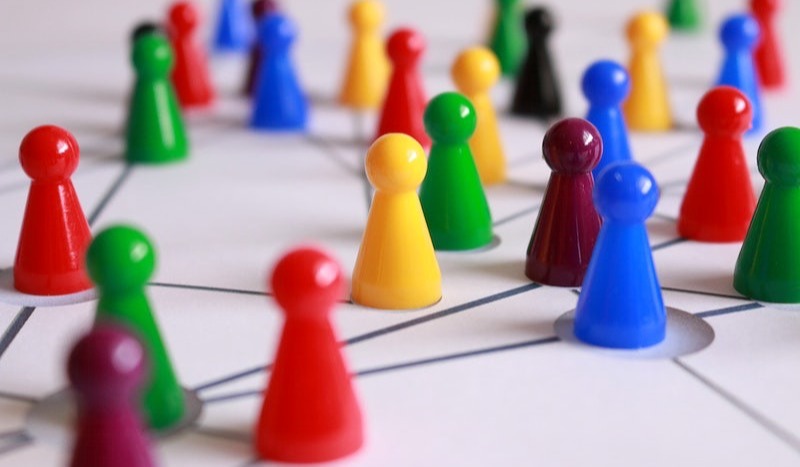Today's Authoritarian Parents
If you are a no nonsense, my way or the highway parent, then chances are you are an authoritarian parent. It is your attention that I want today. I...


“Scientists have recently determined that it takes approximately 400 repetitions to create a new synapse in the brain- unless it is done with play, in which case, it takes between 10-20 repetitions.”- Dr. Karyn Purvis. It is for this reason that I like to incorporate play into my work as often as possible when teaching a new skill. Play lowers inhibitions, is a less intimidating modality for learning, and increases positive contacting. I have listed some games below that may be useful to individuals and clinicians in developing communication skills.
A question is asked about one participant and the other participants guess the correct answer with yes/no cards. There is an adult version and family version of this game. Finding the family version of the game can sometimes be a challenge. If so, simply omit the questions that are inappropriate for your needs. I caution you to consider the pros/cons of asking certain questions and control your response. For instance, there are questions about vaping. You may think that your young person does not struggle with this issue. However, if the question is developmentally appropriate ASK THE QUESTION. It will give you some insight into what they know about the topic. The game also gives participants an opportunity to create their own questions. Here is the opportunity to ask those burning questions (if appropriate) in a nonthreatening way. Despite the answers you receive, maintain your composure. Participants may be looking for an out and an overreaction to a disclosure could be just the opportunity.
Incorrect/correct responses are used to gauge how well you know the participant. It also allows participants to practice vulnerability by revealing information about themselves. I verbally make inferences about relationships i.e frequency of communication, level of intimacy, comfortability with vulnerability with others in the room. Without fail, participants will speak to my observation, provide new insights and/or have an awakening experience. Either way, I gather information to inform treatment and they gather more useful information about themselves.
Jenga but make it feelings. I use "Feelings Jenga" in session to expand feeling vocabulary, practice sharing feelings, and introduce I-statements. I use a permanent marker to write unpleasant and pleasant feeling words. I leave about 6 blocks blank. The blank blocks are used to skip a round or brainstorm your own word. I assess how the blank blocks will operate depending on the client need. For example, a participant struggling with disclosures or identifying feelings may benefit from skipping a round of sharing. However, a person that has mastered these challenges may be suitably challenged with brainstorming their own feeling word.
After a few rounds of regular Feelings Jenga, I up the ante in two ways. (1) I ask participants to hand a block to someone to explore that specific feeling. (2) Participants are asked to use an I-statement and offer a solution. In this round participants are learning to initiate feeling discussions, listen to understand, practice problem solving skills, and set boundaries by offering solutions.
Important to note that if a participant is floundering with finding the words DO NOT SAVE THEM. Allow them to gain the practice finding words that feel true to them. Their brain is a muscle and their struggle is the exercise it needs to build itself.
After particpants have successfully expanded their feeling vocabulary, increased comfortably with vulnerability, and mastered I-statements I introduce UNO as Feelings Jenga 2.0. The UNO card colors are assigned a feeling category. The participant must identify a feeling word that matches the category then create their I-statement. This approach allows participants to practice searching their mind for words that "fit" situations. Participants demonstrate an increase in emotional intelligence, ability to readily identify triggers, confidently offer concise solutions to problems and listening to understand.
This interactive tool is available through Therapist Aid for a nominal fee a month. However, if your therapist (or someone else you know) currently pays for a subscription it can be checked out (like a library book) for 30 days. You will receive a link that will allow you to access the tool. It increases awareness of anxiety terms, unhelpful/unhelpful coping skills, triggers, symptoms, and self care techniques. It may be suitable for those that are comfortable with technology, tele-health, and/or families that are autonomous to one another. Anxiety Bingo requires minimal contacting (talking) as the participants are gaining the information from the screen.
Guesstures may be suitable to match the cognitive capability of younger participants. It may also be suitable for participants that struggle to communicate verbally and demonstrate more developed nonverbal communication skills. Participants are asked to act and guess as fast as they can. Participants practice focusing, problem solving skills, using body language, emotional regulation and stretching attention.
At the close of this game I like to ask about participants experience. I often get responses that fit like two sides of a clam. The first is "This was hard not to speak" and the second is "I enjoyed not talking". Here is the boom moment! I say to the person who is predominately a verbal communicator, "Now you see how hard it can be for (insert name) to communicate verbally with you. Then I say to the nonverbal communicator, "Now you see how much they struggle with your preferred method of communication." And to both of them I say, "Now, I wonder if you two could agree to meet somewhere in the middle?" My hope is that a seed of empathy is planted and they will begin the work for it to grow.

If you are a no nonsense, my way or the highway parent, then chances are you are an authoritarian parent. It is your attention that I want today. I...

I am inviting you, to step inside my mind. Let’s take a deeper look inside me and how I see therapy. I use creative works to provoke thought (or...

I don't subscribe to the belief that to be nice, I must compromise my values and boundaries. Diminishing the most important parts of yourself to fit...